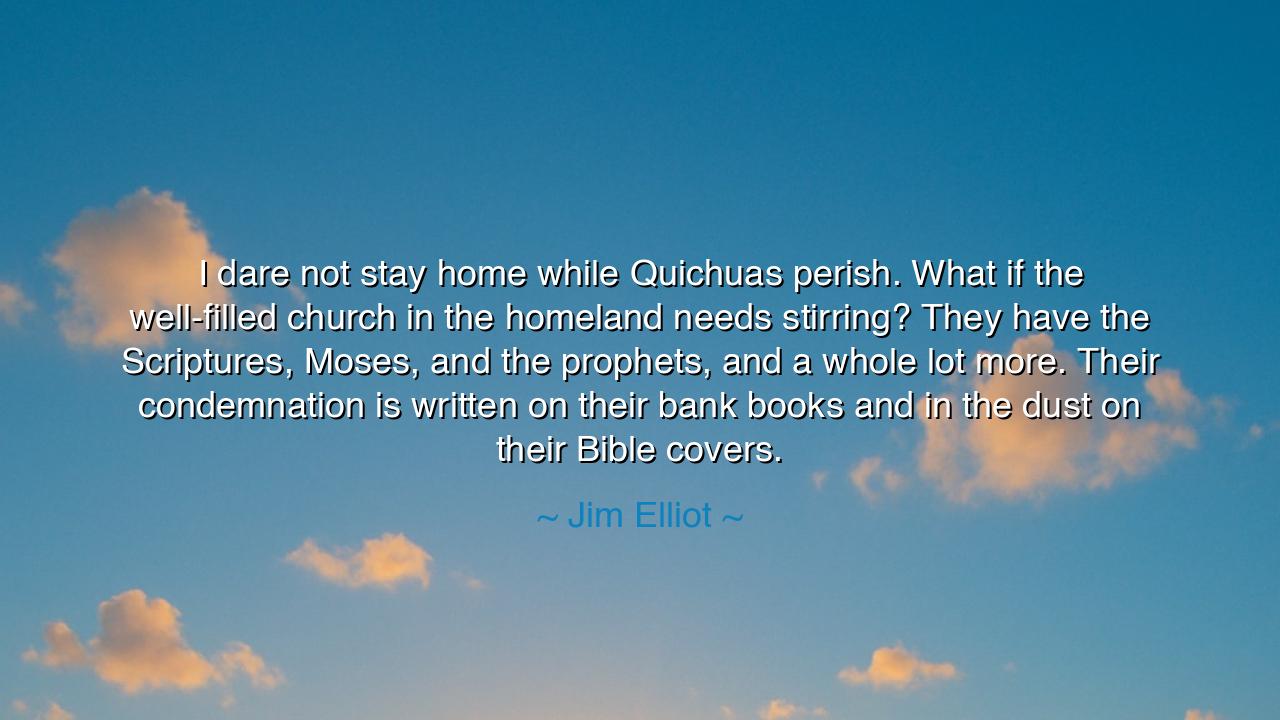
I dare not stay home while Quichuas perish. What if the
I dare not stay home while Quichuas perish. What if the well-filled church in the homeland needs stirring? They have the Scriptures, Moses, and the prophets, and a whole lot more. Their condemnation is written on their bank books and in the dust on their Bible covers.






“I dare not stay home while Quichuas perish. What if the well-filled church in the homeland needs stirring? They have the Scriptures, Moses, and the prophets, and a whole lot more. Their condemnation is written on their bank books and in the dust on their Bible covers.” These burning words of Jim Elliot, the missionary who gave his life in the jungles of Ecuador, sound like the cry of a prophet from the wilderness — fierce, sorrowful, and aflame with divine conviction. In them speaks the soul of a man who saw complacency as death and sacrifice as the only true proof of life. His was not the voice of condemnation alone, but of awakening — a call to rouse sleeping hearts, to stir those who dwell in comfort while others perish in darkness.
The Quichuas, an indigenous people of South America, were among the many tribes Elliot longed to reach with the message he held sacred. In his time, few would venture to such places. The world of the 1950s was already rich with comforts and distractions — cities humming with prosperity, churches full of worshipers yet empty of fire. Elliot looked upon that ease and trembled, not for the poor, but for the comfortable. For he knew that the greatest danger to the soul is not pain, but apathy; not persecution, but plenty. And so he declared: “I dare not stay home.” To stay behind, when others had never even heard the word of hope, was to betray the very faith he claimed to live by.
He saw that faith without movement is like a flame without air — it withers and dies. And so he went, across oceans and jungles, driven by love, not ambition. His words are filled with a holy defiance — the refusal to let the soft hands of comfort silence the call of conscience. “What if the well-filled church in the homeland needs stirring?” he asked, not to scorn, but to awaken. For in his eyes, those who had the Scriptures but lacked compassion were poorer than those who had neither. He knew that the Bible covered in dust was a tombstone of forgotten duty. And the bank book, filled with wealth but empty of mercy, was a ledger of spiritual decay.
The story of Jim Elliot did not end in words. In 1956, he and four other missionaries were speared to death by the Huaorani tribe — the very people they sought to reach with peace. The world looked upon their deaths with shock. Many called it a tragedy, even a waste. But those who saw with clearer eyes understood: their deaths were not the end, but the beginning of a greater work. For the wives and children of those slain did not flee; they returned, forgiving those who had taken their loved ones, and in time, the very tribe that had shed their blood came to embrace the faith they had died to share. Such is the strange and terrible beauty of true devotion — it plants seeds in the soil of sacrifice, and from it grows the tree of redemption.
Elliot’s words carry the weight of the ancients — a message older than kings and empires. It is the same spirit that stirred Moses to forsake Egypt’s wealth, that sent Paul across seas and prisons, that lit the hearts of martyrs through the ages. The call is the same: Do not live for comfort when others die for lack of truth. The homeland’s “well-filled church,” fat with abundance but lean in love, must remember that the measure of faith is not attendance but action, not possessions but compassion.
The lesson is both ancient and urgent: if you would live a life that matters, let your comfort become your offering. Stir yourself when the world tempts you to sleep. Give when the voice of ease tells you to keep. Go where others will not, speak where others are silent, love where others withdraw. For the dust upon your Bible and the gold upon your shelves are both witnesses — one to your neglect, the other to your chains.
So live as Jim Elliot lived — daring greatly, loving fiercely, and counting no cost too high for the sake of truth. For in the end, the strong are not those who stay behind in safety, but those who walk into the fire of purpose, knowing it may consume them. Let no man’s soul grow cold while others perish. And may we, too, one day speak as he did — not with words of comfort, but with the thunder of conviction: “I dare not stay home.”






AAdministratorAdministrator
Welcome, honored guests. Please leave a comment, we will respond soon